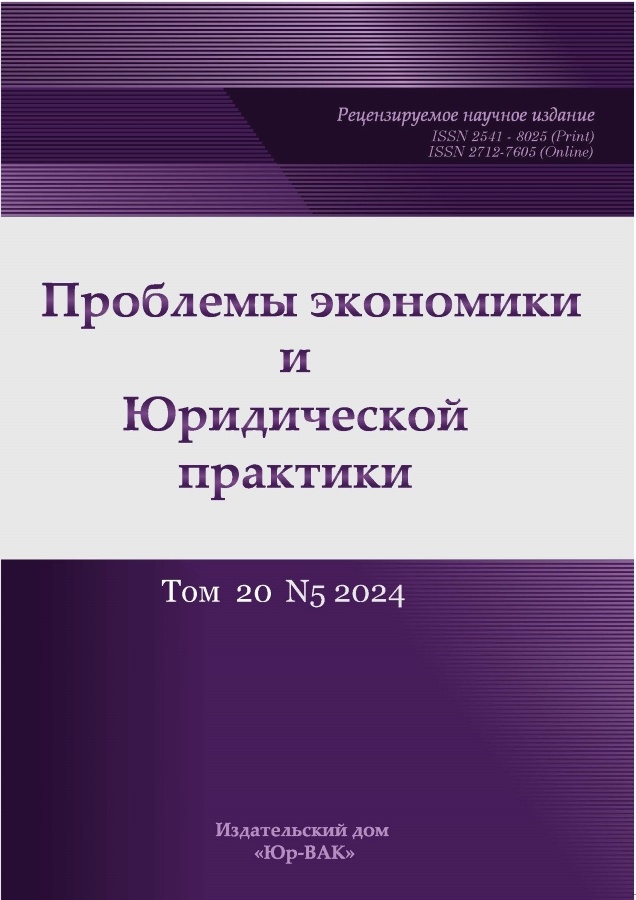On the Issue of Analyzing Ecosystem Interaction in a Single Digital Space
- 作者: Moreva E.L.1, Obolenskaya L.V.1, Korzun I.A.1
-
隶属关系:
- Financial University under the Government of the Russian Federation
- 期: 卷 20, 编号 5 (2024)
- 页面: 134-141
- 栏目: Economic Theory
- URL: https://journals.eco-vector.com/2541-8025/article/view/685615
- EDN: https://elibrary.ru/KBZXAU
- ID: 685615
如何引用文章
详细
The purpose of the research. The article examines the mechanisms of institutionalization of ecosystem interaction (EI) in a unified digital space, with limitations on analysis and assessment of their viability related to the diversity and inconsistency of their interpretations, as well as the lack of developed information base of practical experience in this field. The goal of the research is to develop an approach to study such mechanisms under the constraints and derive practical conclusions for consideration when forming these mechanisms. Conclusions. As a result of the study of EI mechanisms the authors conclude that the absence of explicit complementarity with other existing business mechanisms does not ensure the formation of a fundamentally new micro-level economic system, facilitating the mechanisms analysis in prism of specific interests of different actors to shape and participate in the EI, the availability of the adequate tools of its initiators and their ability to effectively apply them as well. For such subjects the effectiveness of the mechanisms depends not only on common digital foundations for them and their stakeholders, but also on the coherence of individual components of their governance and production systems. For macroeconomic entities, the efficient construction of mechanisms presupposes a preliminary determination of their value for different potential participants, their positions consistency frames and the disposal to coordinate their interests.
全文:
作者简介
Eugenia Moreva
Financial University under the Government of the Russian Federation
编辑信件的主要联系方式.
Email: ELMoreva@fa.ru
ORCID iD: 0000-0001-6355-7808
SPIN 代码: 7145-5829
Scopus 作者 ID: 57203587867
Cand. Sci. (Econ.), Leader research associate, Institute for Financial and Industrial Policy
俄罗斯联邦, MoscowLyudmila Obolenskaya
Financial University under the Government of the Russian Federation
Email: LVObolenskaya@fa.ru
ORCID iD: 0000-0002-1016-9171
SPIN 代码: 7461-0270
Scopus 作者 ID: 57204951512
Cand. Sci. (Eng.), Leader research associate, Institute for Financial and Industrial Policy
俄罗斯联邦, MoscowIlya Korzun
Financial University under the Government of the Russian Federation
Email: nuzrokeli@gmail.com
ORCID iD: 0000-0002-8069-1774
SPIN 代码: 3012-8035
research intern, master's student in «PR and GR technologies in politics and business»
俄罗斯联邦, Moscow参考
- Gorbunov Yu.V. The concept of «mechanism» in economic sciences / Yu.V. Gorbunov // Economy. Profession. Business. 2018. No.2. pp. 17–21.
- Kovalchuk Yu.A. Ecosystem approach to managing the interaction of economic agents in industry. Management Sciences / Yu.A. Kovalchuk, I.M. Stepnov, M.S. Bikalenko // Management Sciences. 2022. 12(3). pp. 6–23.
- Paksyutov G.D. The Netflix business model: economic and socio-cultural significance / G.D. Paksyutov // Bulletin of the Plekhanov Russian University of Economics, 2020. Vol. 17. No. 3 (111). pp. 145–156.
- Stepnov I.M. On ecosystems as a new form of business interaction / I.M. Stepnov, Yu.A. Kovalchuk // Finance of business ecosystems: modern agenda and challenges // Finance: theory and practice. 2023.No. 27(6). pp. 89–100.
- Abeele Van den. Eric Towards a New Paradigm in Open Strategic Autonomy? / Van den Abeele // (ETUI Research Paper—Working Paper. 2021 №03. Р. 34–45.
- A Rich Ecosystem Ignites Innovation, Accelerating Transition to Next-Gen Virtualized Networks / Samsung. 06/26/2023 [Electronic resource] // URL: https://www.samsung.com/global/business/networks/insights/blog/0626-a-rich-ecosystem-ignites-innovation-accelerating-transition-to-next-gen-virtualized-networks (accessed :29.06.2024).
- Benghozi P. Models of ICT Innovation. A Focus on the Cinema Sector / P. Benghozi, E. Salvador, J. Simon / European Commission, Joint Research Centre, Institute for Prospective Technological Studies 2015. [Electronic resource] // URL: https://www.researchgate.net/publication/277300698 (accessed: 10.08. 2024).
- Cobben D. Ecosystem types: A systematic review on boundaries and goals. / D. Cobben, W. Ooms, N. Roijakkers, A. Radziwon // Journal of Business Research. 2022. vol. 142. p. 138–164.
- Davison R. M. The art of digital transformation as crafted by a chief digital officer / R. M. Davison, L. H. Wong // International Journal of Information Management. 2023. vol. 69.
- Foundry? Fabless? Learn about the Semiconductor Ecosystem / Samsung. Tech Blog. 14.02.2020 [Electronic resource] // URL: https://semiconductor.samsung.com/news-events/tech-blog/from-foundry-to-fabless-an-overview-of-the-semiconductor-ecosystem/ (accessed: 20.06.2024).
- Holgersson M. The forces of ecosystem evolution / M. Holgersson, C.Y. Baldwin, H. Chesbrough, M.L. Bogers. // California Management Review. 2022; t. 64(3). P. 5–23.
- Li S. Exploring the effect of digital transformation on Firms' innovation performance /S Li, L. Gao, C. Han, B. Gupta, W. Alhalabi, S. Almakdi // Journal of Innovation & Knowledge. 2023. vol. 8(1).
- Liu M. Digital transformation, risk-taking, and innovation: Evidence from data on listed enterprises in China / M Liu, C. Li, S. Wang, Q. Li // Journal of Innovation & Knowledge.2023. vol. 8(1).
- Kolagar Milad. Ecosystem transformation for digital servitization: A systematic review, integrative framework, and future research agenda / Kolagar Milad,Vinit Parida, David Sjodin // Journal of Business Research. 2022. vol. 146. p. 176–200.
- Marko Kohtamäki. Managing digital servitization toward smart solutions: Framing the connections between technologies, business models, and ecosystems / Marko Kohtamäki, Rodrigo Rabetino, Vinit Parida, Stephan C. Henneberg, David Sjödin// Industrial Marketing Management. 2022. № 105(1). P. 253-267
- Milad Kolagar. Ecosystem transformation for digital servitization: A systematic review, integrative framework, and future research agenda / Milad Kolagar, Vinit Parida, David Sjodin // Journal of Business Research. 2022. №146. P. 176–200.
- Pejvak Oghazi. Ecosystems transformation through disruptive innovation: A definition, framework and outline for future research / Pejvak Oghazi, Vinit Parida, Joakim Wincent, Rana Mostaghel // Journal of Business Research. 2022. №147. P. 16–26.
- Peijie Wang. Science, technology and innovation policy in Russia and China—Mapping and comparisons in objectives, instruments and implementation / Peijie Wang, Fan Li // Technological Forecasting and Social Change. 2021. № 162. Р. 122–145.
- Samsung Value Chain Analysis / Boardmix.2020 [Electronic resource] // URL: https://boardmix.com/analysis/samsung-value-chain / (accessed: 21.08.2024).
补充文件










